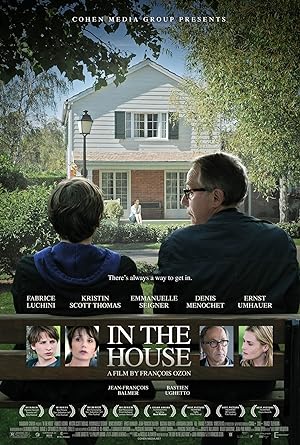In the House is a delicious little movie that I highly recommend even if you hate subtitles. In the House is about a middle-aged married English teacher who begins another school year ensconced in the Sisyphean task of getting teenagers to learn. His personal life, especially his marriage, is a rich life of the mind so his disappointment in his career is palpable until he stumbles upon a homework assignment that engrosses him and his wife so much that it changes the lives of all connected to it.
In the House is what The English Teacher starring Julianne Moore should have been. In the House is about the seductive nature of the creative process for the creator and the consumer, which also includes the critic or mentor. The characters are real people, but the story also enters its readers and writer. The life of the mind is so passionate and disruptive that it is verging on sexual without the physical act. The imagination of the reader enhances the story. There is a point in the movie when it becomes difficult to tell which part of the movie is the written story being depicted on the screen and which part is life unfolding for the characters of In the House.
In the House is a metaphoric vampire movie, but different characters take turns playing the role of the vampire throughout the film. The teacher may act like a critic, but he loves the story. The writer, a teenage boy, recognizes the power that he wields over his readers and his subjects. The character of the written story also wields a power even when unaware of his or her notoriety. This changing parasitic relationship is an escape from some unsatisfactory element of life. Most of the older characters are having a midlife crisis even if it is not initially apparent to the characters of In the House or the viewers. That frustration with the disappointment of life is reflected in their work failures. When it is finally revealed what the writer is escaping from in a brief scene near the end of the film, it is a powerful, understated moment that will make you judge his readers and yourself as an audience for letting him entertain and change you without thinking if you are beneficial to a teenage boy. As consumers, we are very demanding in our expectations of what the creator should do for us-keep writing that story, no, not that way, what about this. In the House asks what the audience owes the creator. We basically sucked that teenage boy dry without considering if we owed him a fiduciary duty.
In the House’s blood is the finite resource of attention. In the House sees all art, movies, reading, writing, exhibits in galleries, as competing for viewers’ attention and seeking external validation. If a tree falls in the woods, and no one is there to see it, is it still valid? It may be, but it may not be able to fall again without our time and money, which are in short supply and dominated by philistines without the insight, talent or appreciation of how hard it is to put on a show.
In the House is a very French movie, not American. In the House is not melodramatic. No one gets murdered. In the House is also not a perfect movie. I began to lose interest in the story during the last half hour, which is fine when you already got 1 hour and 15 minutes of riveting perfection. Kristin Scott Thomas plays the teacher’s wife, and for those of you who thought that her career began and ended with The English Patient, do yourself a favor and rectify that ignorance immediately. This British actress has been doing outstanding acting in French cinema in French for quite some time now. A bilingual actor is a rare phenomenon.
In the House explores how our voyeuristic tendencies are nurtured by our choice of entertainment, and the most successful creative process changes everyone involved. In the House is a must see film.
Stay In The Know
Join my mailing list to get updates about recent reviews, upcoming speaking engagements, and film news.





